Share
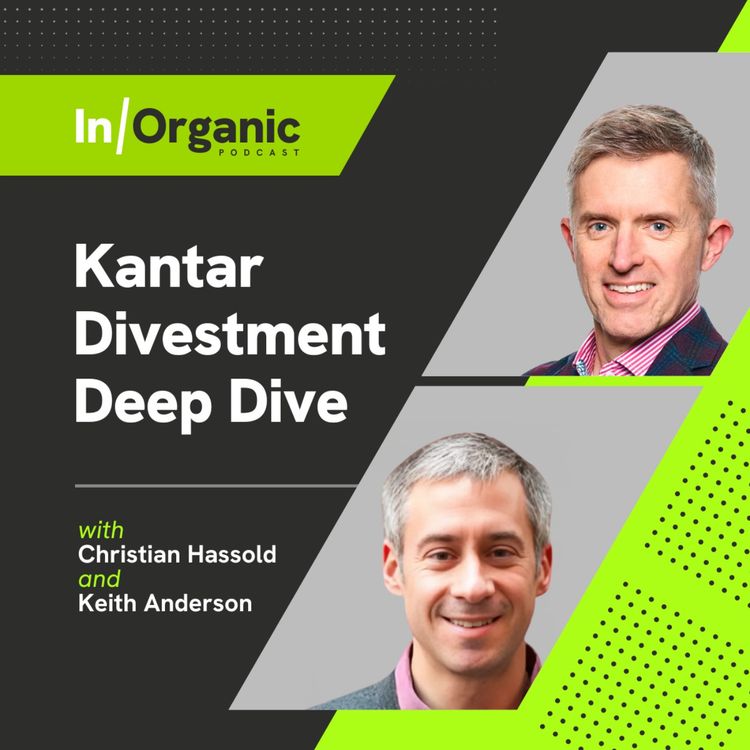
In/Organic Podcast
E19: Kantar Divestment Deep Dive with Keith Anderson
Summary
In this episode of the In/organic Podcast, host Christian Hassold and guest Keith Anderson delve into the evolving landscape of data measurement, focusing on WPP's potential divestment of Kantar. They discuss the implications of this move, the importance of independent measurement in advertising, and the future of Kantar in the market. The conversation also touches on the challenges agencies face in adapting to a rapidly changing media environment and the need for collaboration and innovation within the industry.
Takeaways
- WPP is exploring the sale of its stake in Kantar to streamlines its business and bring more cash onto their balance sheet
- Kantar is known for its consumer panel businesses and global footprint, WPP currently owns 40%, Bain Capital owns 60%.
- Independent measurement is crucial for advertisers but the capabilities on a standalone basis are becoming commodified
- The agency business is facing significant challenges, global agencies must elevate their offerings to remain competitive in a world where clients are seeking to consolidate spend with a single global partner
Chapters
00:00 Introduction
05:23 Understanding WPP and Kantar's Relationship
09:22 WPP's Strategic Reasons for Acquiring Kantar
12:46 Independent Measurement in Performance Marketing
16:47 Bain's Potential Divestment of Kantar
20:45 Analyzing WPP's Tech Strategy & CTO vs CPO
23:54 Kantar's Potential Acquirers
28:12 Agency Evolution and Collaboration in a Changing Market
35:04 Conclusion
Connect with Christian & In/organic Podcast
Christian's LinkedIn: https://www.linkedin.com/in/hassold/
In/organic on LinkedIn: https://www.linkedin.com/company/inorganic-podcast
In/organic on YouTube: https://www.youtube.com/@InorganicPodcast/featured
Connect with E19 guest, Keith Anderson on LinkedIn
https://www.linkedin.com/in/keithanderson101/
Episode References
WPP FGS Divestment Announcement: https://www.wpp.com/en/news/2024/08/wpp-to-sell-its-majority-stake-in-fgs-global
Reuters divestment press: https://www.reuters.com/business/wpp-is-considering-sale-stake-bains-kantar-source-2024-01-10/
More episodes
View all episodes

E27: Agency Valuations & Structuring 201b w/Ayelet Shipley
24:31|SummaryThis is part two of a two-part series where Christian Hassold and Ayelet Shipley demystify the complexities of agency valuations, exploring the interplay between buyer and seller motivations, and discussing real-world scenarios that illustrate various deal structures. They emphasize the importance of understanding the unique dynamics of the agency market, including the factors that influence valuations and the creative structuring of deals to meet the needs of both parties. Discussion HighlightsReviews a $3.4M revenue, $1.7M EBITDA agency valued at $10.2M (6x multiple). Creativity is needed for deals under $2M EBITDA due to higher perceived risk and sensitivity of margins.This deal involved a 50% cash consideration ($5.1M) and 50% rollover ($5.1M). The cash consideration was paid quarterly over three years, performance-based (not an earnout), with payments halted or reduced if revenue drops significantly (below 50% or 50-99% of the agreed-upon value).We also discussed a second deal involving a $40M revenue agency with $9M EBITDA commanding a 10x multiple ($90M EV) - a top of market multiple because of high gross retention (>85%) and >80% retainer-based clients. The challenge is managing the risk of large clients churning post-closing when the multiple is top of the market.Involved a 15% rollover. A significant earnout (up to an extra $9M) is offered to bridge the gap and incentivize the seller for growth.Beyond financial metrics, we discuss factors that influence valuations like the acquiring entity's need for specific capabilities, clients, talent, customer retention, and consistent growth (10-20% year-over-year).Chapters0:00 Introduction 2:06 Scenario D: Structuring a Deal Below $2M EBITDA3:10 Why Sub-$2M EBITDA Deals Are Hard4:53 Performance-Based Cash Payouts 6:18 Keeping Sellers Engaged Through Uncertainty7:52 Incentivizing Sellers Through Equity and Bonuses11:21 Scenario C: Challenges of Scaling a Large Agency12:57 Structuring a $40M, $9M EBITDA Deal at 10x15:28 Market View on Earnouts in EV19:25 When Growth and Retention Justify High Multiples20:50 Market Range for Cash-at-Close Offers21:20 How Strategic Buyers Compete with HoldCos22:53 Wrap-Up & Closing ThoughtsConnect with Christian & In/organic PodcastChristian's LinkedIn: https://www.linkedin.com/in/hassold/In/organic on LinkedIn: https://www.linkedin.com/company/inorganic-podcastIn/organic on YouTube: https://www.youtube.com/@InorganicPodcast/featuredConnect with E27 guest, Ayelet Shipley on LinkedInhttps://www.linkedin.com/in/ayelet-shipley-b16330149/
Hot Take: First Time Sellers - Don't count your winnings until the deal docs are signed!
04:04|Summary While recording episodes 26 and 27 of the In/organic Podcast, Ayelet and Christian delved into a small rabbit hole, discussing buyer and seller dynamics in transactions involving unsophisticated buyers and sellers - a term commonly used in the industry. We clarify in the video that unsophisticated really means buyers who do not do a lot of acquiring or sellers who are usually selling their company for the first time and do not have good M&A counsel. We did not get into the details in this recording, but the key takaways are: If you are a first time seller: 1) Be Informed: Retain experienced M&A counsel - that is an attorney who specializes in M&A (which is different from a business lawyer who touches M&A, but is not a transactional lawyer by trade). Most M&A lawyers are already in your network and are willing to offer 1-2 hours of off-book time to help with key considerations before getting too far along in the process. 2) Ask the sellers questions. If you don't understand terms or if there is anything that is unclear, go ahead and ask. For example, if you are offered $10 million for your business, is that all cash, a closing, or something else? If it includes stock in the sellers company, you have a right to ask for some information from the acquiring company ("reverse diligence") in order to qualify the value of the stock in the company relative to the value you are exchanging. If you are an unsophisticated buyer: 1) Get Ahead of Legal: Don't let the lawyers be the first ones to bring forward terms that will economically impact the deal without having spoken about it first. Example things are escrow, reps & warranties insurance, special indemnities, discounts to EBITDA derived from quality of earnings analysis. When you are 5 steps ahead of key negotiating items in legal, it builds trust and keeps legal costs under control. 2) Agree on the earnout structure and compensation before going to LOI or drafting definitive agreements. This is basic, but the intent is that the seller is a part of the creation of the construct versus a recipient. Even if there is not a lot of room for flexibility, its much better to preview and ask for input than throw over the fence and have lawyers negotiate the terms. Enjoy!
E26: Agency Valuations & Structuring 201a w/Ayelet Shipley
33:42|SummaryIn this episode, Christian Hassold and Ayelet Shipley delve into the complexities of agency valuations, exploring the interplay between buyer and seller motivations, and discussing real-world scenarios that illustrate various deal structures. They emphasize the importance of understanding the unique dynamics of the agency market, including the factors that influence valuations and the creative structuring of deals to meet the needs of both parties. In this conversation, Ayelet and Christian delve into the intricacies of business valuation, particularly focusing on earn-outs and creative deal structures. They explore how earn-outs can bridge the gap between current cash and total enterprise value, especially in lower EBITDA scenarios. The discussion also highlights the dynamics of larger deals, emphasizing the importance of timing and the need for sellers to recognize good opportunities in a fluctuating market. The conversation is rich with insights on how to structure deals that meet both buyer and seller needs while navigating the complexities of agency acquisitions.Takeaways• A deal occurs in the overlap of buyer and seller needs.• Creative structuring can lead to better outcomes for sellers.• The agency market is dynamic with many new entrants and exits.• People, client relationships, and capabilities are key assets in agency valuations.• Valuations can vary significantly based on market fit and potential.• Understanding the motivations of both buyers and sellers is crucial.• The agency landscape is evolving with increasing deal velocity. Earn-outs can be a strategic tool in business valuation.• Trust between buyer and seller facilitates smoother transactions.Chapters0:48 Introduction 1:59 Why Agencies Are Built and Sold 8:03 How Buyers Assess Value 12:10 Cash Upfront vs. Long-Term Upside 14:28 Real-World Deal Scenarios 15:02 Scenario B: Traditional 80/20 Deal 19:33 Earnout Treatment in Valuation 21:21 Scenario D: Creative Deal for Smaller Agencies 26:27 Performance-Based Payment Adjustment 29:23 Why Larger Deals Are Different 32:41 Wrap-UpConnect with Christian & Inorganic PodcastChristian's LinkedIn: https://www.linkedin.com/in/hassold/In/organic on LinkedIn: https://www.linkedin.com/company/inorganic-podcastIn/organic on YouTube: https://www.youtube.com/@InorganicPodcast/featuredConnect with E26 guest, Ayelet Shipley on LinkedInhttps://www.linkedin.com/in/ayelet-shipley-b16330149/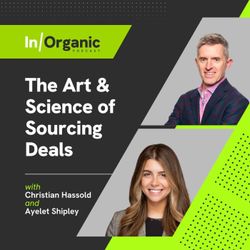
E25: The Art & Science of Sourcing Deals
40:21|SummaryIn this episode, host Christian Hassold chats with Ayelet Shipley, the head of corporate development and deal management for Speed M&A by Jones-Spross. Ayelet shares her unique journey from aspiring therapist to corporate development leader, emphasizing the importance of sales skills and psychological insights in the M&A process. The conversation delves into sourcing opportunities, qualifying conversations, and understanding client expectations, drawing the connections between the similarities of enterprise sales and M&A deal origination.In this conversation, Ayelet and Christian delve into the intricacies of the acquisition process, focusing on understanding seller motivations, evaluating business fit, and navigating decision-making dynamics. They discuss the importance of asking specific and open-ended questions to understand the intent and motivations of potential sellers and how to identify points of alignment or misalignment. They also discuss the importance of rapport building and the sell-side bankers' valuable role in the process.TakeawaysAyelet transitioned from a potential career in therapy to corporate development after realizing her skills could be applied in business.Understanding acquisition candidate pain points is crucial in the discovery processThe process of sourcing opportunities requires a strategic approach to identify potential targets. Understanding seller motivations is crucial for alignment.Setting clear expectations about deal structures is importantQualifying questions help determine if a deal is worth pursuing furtherAyelet emphasizes the importance of her background in psychology and sales as foundational for making her successful in this work.Ayelet emphasizes the importance of psychological insights in sales conversations.Transparency throughout the process fosters better outcomes.Chapters00:00 Introduction00:55 Ayelet's Background in Psychology and Sales07:15 Goals of Call 111:26 Deciding to Advance Past Call One13:54 Setting Valuation Expectations 15:30 Goals of Call 218:48 Matching Verbal Claims to Financials21:55 Advancing Further and Disqualifiers24:48 Scoring to Qualify Deals25:05 Keeping Evaluation Criteria Simple28:48 Identifying Decision-Makers 31:10 Distinguishing Uncommitted Sellers33:36 Working with Sellside Bankers39:33 ConclusionConnect with Christian & In/organic PodcastChristian's LinkedIn: https://www.linkedin.com/in/hassold/In/organic on LinkedIn: https://www.linkedin.com/company/inorganic-podcastIn/organic on YouTube: https://www.youtube.com/@InorganicPodcast/featuredConnect with E24 guest, Ayelet Shipley on LinkedInhttps://www.linkedin.com/in/ayelet-shipley-b16330149/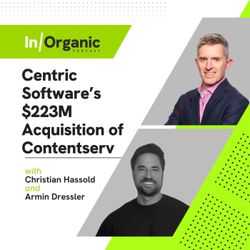
E24: Centric SW $223M Acquisition of Contentserv ft. Armin Dressler
41:50|SummaryIn this episode of the Inorganic Podcast, host Christian Hassold discusses the recent acquisition of ContentServ by Centric Software with their co-founder and former board member Armin Dressler. Their discussion spans the history of Contentserve, its journey from an on prem to SaaS solution, transition of leadership to the current CEO, Michael Kugler, and the details of the M&A process. This episode discusses the acquirer, their rationale and some of the inside baseball on the deal valuation. Chapters0:00 Introduction2:54 How Contentserv Built Its Market Position10:01 Key Learnings from how ContentServ evolved14:02 Insights on Leadership Changes19:49 Why It Was the Right Time to Sell23:37 The Sale Process and Participants26:23 Why Centric Software Made the Acquisition36:02 Implications for the PIM and Commerce Ecosystem40:46 ConclusionConnect with Christian & In/organic PodcastChristian's LinkedIn: https://www.linkedin.com/in/hassold/In/organic on LinkedIn: https://www.linkedin.com/company/inorganic-podcastIn/organic on YouTube: https://www.youtube.com/@InorganicPodcast/featuredConnect with E24 guest, Armin Dressler on LinkedInhttps://www.linkedin.com/in/armindressler/?originalSubdomain=chReferenceshttps://www.3ds.com/newsroom/press-releases/dassault-systemes-announces-centric-softwares-acquisition-ai-powered-pxm-solution-contentservhttps://www.investcorp.com/investcorp-agrees-to-sell-software-vendor-contentserv/
E23: The Take Private of a Zombie by Bending Spoons for $233M
32:37|SummaryIn this episode of the Inorganic Podcast, hosts Christian Hassold and guest Erik Morton delve into the planned acquisition of Brightcove by Bending Spoons. They explore the dynamics of the deal, the market context, and the implications for both companies. Brightcove, a pioneer in online video hosting, faced challenges in a competitive landscape that evolved substantially due to digital video creation and storage innovation, notably the free models offered by YouTube and Vimeo. Christian and Erik discuss Bending Spoons' pattern of being an acquirer of distressed businesses and how they typically run the businesses post-acquisition to maximize return on investment. This episode is an interesting look at how tech “Zombies” find a home through strategic acquisition when operating standalone is not a credible option.TakeawaysThe acquisition of Brightcove by Bending Spoons is part of a broader roll-up strategy that has been executed multiple times prior.Bending Spoons has been particularly interested in notable companies that became distressed due to commoditization or lack of differentiation, yet still had loyal enterprise or SMB customer bases.The acquisition price reflects Brightcove's current market challenges and growth.Public companies face immense pressure to grow, leading to take-private transactions when they cannot without making drastic changes that public markets don’t appreciate.The concept of 'zombie' companies is relevant in today's market, highlighting the impact of stagnation on management and employees.We will see more transactions like these as Zombie companies both public and private face growth challenges.Chapter Markers0:00 Introduction2:52 Background on Brightcove5:15 Background on Bending Spoons07:18 Insights on the Deal Valuation11:37 Brightcove's Engineering Costs & Financial Health14:48 Anticipating Radical Changes Post-Acquisition21:46 Investor Returns and Employee Compensation28:25 Takeaways 32:12 ConclusionConnect with Christian & In/organic PodcastChristian's LinkedIn: https://www.linkedin.com/in/hassold/In/organic on LinkedIn: https://www.linkedin.com/company/inorganic-podcastIn/organic on YouTube: https://www.youtube.com/@InorganicPodcast/featuredConnect with E20 guest, Erik Morton on LinkedInhttps://www.linkedin.com/in/erikimorton/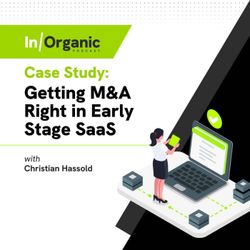
E22: Case Study on Getting M&A Right in Early Stage SaaS ft. Crisp
28:48|SummaryIn this episode of the Inorganic Podcast, host Christian Hassold delves into a case study on the startup Crisp (gocrisp.com), which has successfully executed four acquisitions over the last 2 years. The discussion covers the company's background, the leadership dynamics, and the strategic rationale behind its inorganic investments. The episode serves as a case study to demonstrate what good M&A looks like in an early to mid stage SaaS company and what features of M&A targets companies should be thinking about at that stage. As a part of the discussion, Christian dives into some of the deal specifics and the economic benefits to Crisp based on opinion and publicly accessible information.Takeaways- M&A could be as effective as traditional sales, marketing, and product investments.- What problem is Crisp solving and why is it important- Background on Crisps substantial financing and debt rounds- What kinds of M&A has Crisp executed and why- How the deals Crisp has executed have likely helped fuel their growth- What can other startups learn from Crisp's approach to M&A- Order of the kinds of deals a company might do is a consideration in building the M&A muscle in an early to mid-stage SaaS company- The startup ecosystem often underestimates the value of M&A Chapter Markers0:00 Introduction03:19 The Case for M&A in Early Stage Startups05:14 Crisp's Company Profile08:28 Pre-conditions for M&A in Early Stage Startups13:37 Breakdown of Crisp's Four Acquisitions20:37 Crisp's Acquisition Strategy22:01 Financial Case for Crisp’s M&A24:28 Analyzing the Order of Crisp's Deals26:37 Reflecting on Crisp's Strategy28:10 ConclusionConnect with Christian & In/organic PodcastChristian's LinkedIn: https://www.linkedin.com/in/hassold/In/organic on LinkedIn: https://www.linkedin.com/company/inorganic-podcastIn/organic on YouTube: https://www.youtube.com/@InorganicPodcast/featuredEpisode References:https://www.linkedin.com/in/aretraasdahl/https://finance.yahoo.com/news/crisp-raises-50m-series-b-140500449.html?utm_source=chatgpt.comhttps://www.sec.gov/edgar/search/#/ciks=0001818100&entityName=Crisp%252C%2520Inc.%2520(CIK%25200001818100)chrome-extension://efaidnbmnnnibpcajpcglclefindmkaj/https://ir.youradv.com/static-files/d47814ee-084c-4c53-9b0f-9a9753f9e9cfEpisode Outline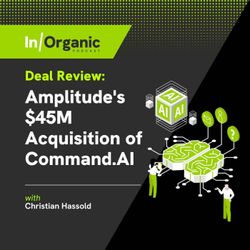
E21: Deal Review - Amplitude's $45M Acquisition of Command.AI
12:06|SummaryIn this episode of the Inorganic Podcast, host Christian Hassled discusses the acquisition of Command AI by Amplitude Software. The conversation delves into the deal's details, including the financial aspects, the rationale behind the acquisition, and the implications for both companies. Christian highlights the challenges faced by early-stage startups in the current economic climate and the strategic decisions that founders must make to exit now or continue burning cash not knowing if the fundraising market will the there for them when they need it. The episode concludes with key learnings from the transaction, emphasizing the importance of founders making the tough decision to sell even when they have a credible product and plenty of runway to keep going.TakeawaysAmplitude acquired Command AI for $45M, $20M net of cashAmplitude is a public company with a market cap of $1 billion, this is their 5th acquisition in 5 yearsCommand AI was an early-stage startup backed by Insight Ventures, among others. The company reports it was flush with cash and agreed to be soldThe deal reflects a smart strategic move in a tough market for SaaS companies.Command AI's technology aligns well with Amplitude's product offerings.This deal is interesting because it helps understand how public companies value venture-backed startups in the current economy.This deal also examples AI tech consolidation and the relative values for such companies.Chapter Markers00:00 Introduction01:7 Background on Command AI02:49 Introduction to Amplitude Software04:51 Deal Details and Controversy Around Price06:00 Analyzing the Deal Structure and Rationale09:35 Learnings from the Deal11:37 ConclusionConnect with Christian & In/organic PodcastChristian's LinkedIn: https://www.linkedin.com/in/hassold/In/organic on LinkedIn: https://www.linkedin.com/company/inorganic-podcastIn/organic on YouTube: https://www.youtube.com/@InorganicPodcast/featuredEpisode Referenceshttps://www.linkedin.com/in/spenserskates/ https://amplitude.com/blog/amplitude-acquires-command-aihttps://news.ycombinator.com/item?id=41849907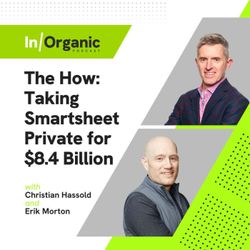
E20: The How: Taking Smartsheet Private for $8.4 Billion with Erik Morton
52:45|SummaryIn this episode of the Inorganic Podcast, Christian and Erik delve into the complexities of take private transactions, using Smartsheet's recent acquisition as a case study. They discuss the economic challenges facing public companies, the lifecycle of a business transitioning from public to private, and the strategic considerations for boards contemplating such moves. The conversation highlights the importance of fairness opinions and the intricate dynamics of investor strategies in these transactions. In this conversation, Erik and Christian delve into the complexities of take-private transactions, focusing on the negotiation dynamics, the role of advisors, regulatory considerations, the impact on employees, and the financial structuring that influences investor returns. They use the Smartsheet deal as a case study to illustrate these concepts, providing insights into the motivations behind such transactions and the implications for all parties involved.TakeawaysPublic companies face unique challenges that may lead them to consider going private.The lifecycle of a business includes transitioning from public to private ownership.Smartsheet's acquisition is a significant case study in the current market.Initiating acquisition conversations requires careful preparation and strategy. The Smartsheet deal features a go-shop provision allowing for additional bids.Advisors play a crucial role in take-private transactions, including bankers and consultants.Regulatory dynamics can complicate interactions between buyers and sellers.Employees in public companies face different equity compensation structures when taken private.Investor returns are influenced by the capital structure and debt servicing costs.The liquidity of equity compensation differs significantly between public and private companies.Chapters00:00 Introduction04:04 Understanding Take Private Transactions08:28 Analyzing the Smartsheet Case Study15:53 Transaction Dynamics and Investor Strategies20:44 How Fairness Opinion Works23:28 Initiating Acquisition Conversations29:18 Advisors in Take-Private Transactions31:48 Do's and Dont's for Potential Acquirers37:33 Impact of Take-Private Transactions on Employees45:41 Erik Morton's Hypothetical Simple Exit Waterfall51:38 ConclusionConnect with Christian & In/organic PodcastChristian's LinkedIn: https://www.linkedin.com/in/hassold/In/organic on LinkedIn: https://www.linkedin.com/company/inorganic-podcastIn/organic on YouTube: https://www.youtube.com/@InorganicPodcast/featuredConnect with E20 guest, Erik Morton on LinkedInhttps://www.linkedin.com/in/erikimorton/Episode Referenceshttps://investors.smartsheet.com/news/news-details/2024/Smartsheet-to-be-Acquired-by-Blackstone-and-Vista-Equity-Partners-for-8.4-Billion/default.aspxhttps://www.wsj.com/articles/smartsheet-to-be-taken-private-by-pe-firms-in-8-4-billion-deal-7296758c